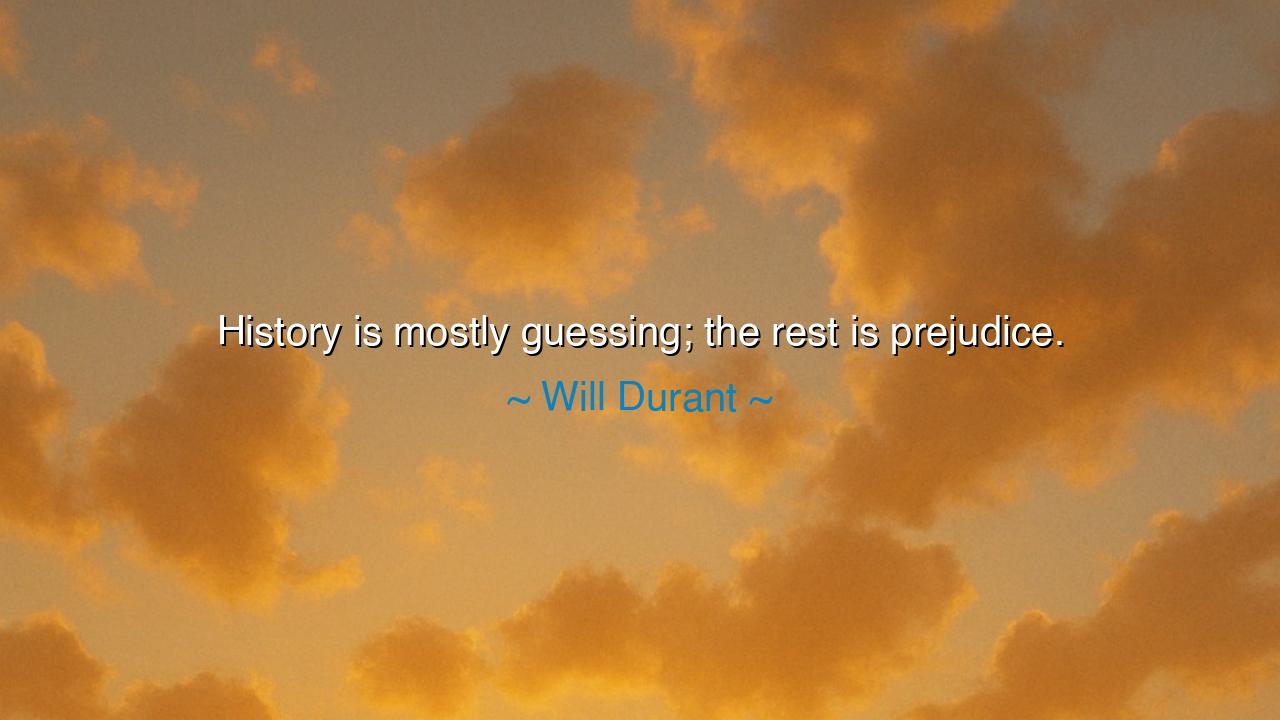
History is mostly guessing; the rest is prejudice.






When the historian Will Durant wrote, “History is mostly guessing; the rest is prejudice,” he was not mocking the past — he was unveiling its illusion. His words, sharp as a scholar’s quill yet heavy as prophecy, remind us that the grand tale we call history is not a mirror, but a shadow — shaped by the hands of those who remember, and distorted by the hearts of those who record. To study history, Durant says, is to walk through a fog of memory, guided by fragments, rumors, and relics. What we call “truth” is often interpretation, and what we name “fact” may only be belief draped in authority.
For who among mortals can truly see the past? Time devours witnesses, and silence buries truth. Every chronicle, every parchment, every monument speaks not only of what happened, but of what its teller wished to endure. Kings write of their victories; priests of their revelations; conquerors of their glory. The fallen rarely hold a pen. Thus, the scroll of history is woven from guesswork — scholars piecing together broken records, inferring motives from ashes and echoes. And when the guessing ends, prejudice begins: the historian’s heart, shaped by culture, faith, or pride, colors what remains.
Think, for instance, of the tale of Cleopatra, queen of Egypt. To her enemies, she was a seductress — a woman of cunning and corruption. To her own people, she was a savior who held back the tide of Roman conquest. Which story is true? Both, perhaps — and neither. What survives of her is not her own voice, but the words of those who feared or desired her. The Romans, in their victory, wrote her downfall; they called her serpent and sorceress. Centuries later, others, guessing at her grace, painted her as goddess and martyr. Thus she lives in history not as she was, but as the world has imagined her — a creation of guess and prejudice.
Durant’s words pierce deeper still, for they warn not only of history’s frailty but of our own blindness. Each generation, gazing backward, remakes the past in its own image. The modern man sees ancient warriors as brutes or heroes depending on his creed; the revolution that one age calls liberation, another calls rebellion. So does prejudice creep in like ivy upon old stone, twisting truth until it wears the colors of our own desire. Even the noble historian, seeking only accuracy, cannot escape the weight of his era. His ink, though pure, flows from a pen carved by culture.
And yet — though history may be guessing, it is not worthless. From the mist, we still hear the beating of the human heart. Though records are uncertain and accounts distorted, they carry within them the eternal rhythm of struggle, ambition, and hope. The lesson is not that history deceives, but that it must be read with humility. We must remember that every page is an argument between memory and myth, every chronicle a mirror that reflects more of the writer than the world he describes.
Therefore, O seeker of wisdom, approach the past not as a judge, but as a pilgrim. Read between the lines, and question the silence. When you encounter a tale of heroes and villains, ask: Who told this story? and Whose story was never told? Do not cling to the comfort of certainty, for it is the enemy of understanding. Let curiosity guide you more than faith in any single truth. For it is through doubt — not dogma — that wisdom grows.
And in your own life, remember that you too are writing history — not with ink, but with action. Others will one day guess your motives and prejudge your deeds. So live in such a way that even their errors honor your integrity. Seek truth, but hold it lightly; speak boldly, but listen deeper. For the wise know that the past is a riddle whispered through generations, and that only through humility can one begin to hear the truth within the guessing, and the light that flickers even through the prejudice.






AAdministratorAdministrator
Welcome, honored guests. Please leave a comment, we will respond soon